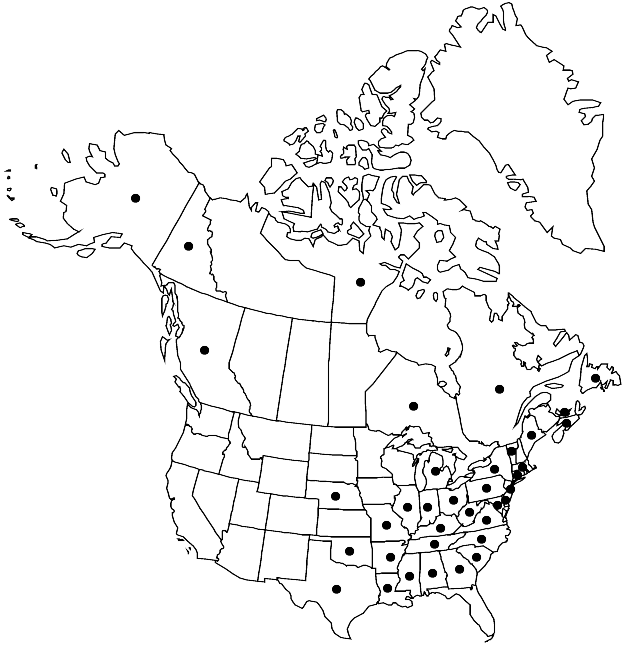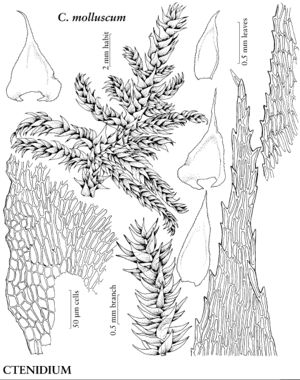Ctenidium molluscum
J. Linn. Soc., Bot. 12: 509. 1869.
Stems 3 cm. Leaves at stem apices usually falcate-secund, evenly divergent. Stem leaves 0.8–1.3 mm; margins strongly denticulate; apex acuminate from near base; laminal cells 40–50 µm, strongly prorulose at least distally. Branch leaves with margins rarely recurved basally.
Phenology: Capsules mature summer.
Habitat: Soil, thin soil over rock, humus, tree roots, decayed logs, stumps, moist areas
Elevation: low to high elevations
Distribution

B.C., Nfld. and Labr. (Nfld.), N.S., Nunavut, Ont., P.E.I., Que., Yukon, Ala., Alaska, Ark., Conn., Del., Ga., Ill., Ind., Ky., La., Maine, Md., Mass., Mich., Miss., Mo., Nebr., N.J., N.Y., N.C., Ohio, Okla., Pa., S.C., Tenn., Tex., Vt., Va., W.Va., Europe, Asia, n Africa.
Discussion
N. Nishimura (1985) indicated that Ctenidium in eastern North America differed from true C. molluscum of Europe by its flexuose, unhooked leaves at branch apices, less falcate leaves, thin-walled, more prorulose laminal cells, and longer, thin-walled alar cells. This distinction is not upheld here. There may be a statistically distinguishable race in eastern North America as suggested by G. Pedano (1996), but there is no practical separation that might be represented in a key.
Ctenidium malacodes Mitten has been incorrectly reported from Nova Scotia, Ontario, Louisiana, Michigan, Mississippi, Missouri, and North Carolina. The species is essentially Latin American, uniformly but weakly distinguished south of the flora area by stronger distal marginal denticulation and thinner-walled alar cells. However, these traits are sometimes duplicated in specimens from eastern North America and Europe. Ctenidium molluscum was distinguished (N. Nishimura 1985) from C. malacodes by the former having more pinnate branching, more strongly falcate-secund stem leaves with narrower bases, and relatively thick-walled and sometimes shorter alar cells. Ctenidium malacodes is tentatively excluded from the flora area pending a more focused comparison of New World populations. Variety condensatum of eastern Canada is a weakly denticulate form with slenderly tapering leaf apices and is not here considered a distinct taxon.
Selected References
None.
